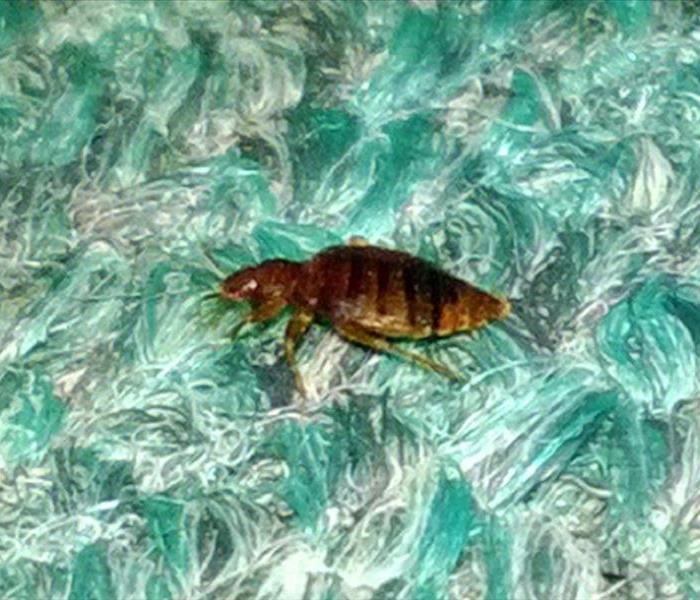Archived General Blog Posts
How to Prevent Bed Bugs
3/7/2016 (Permalink)
Bed bugs are a pretty popular news subject as of late. While these little creatures can be annoying to get rid of, the important thing to know is that they aren’t actually that harmful to your health. Bed bugs are not known to transmit diseases and their bites are itchy but not painful.
If you are worried about these pests invading your home or hitching a ride into your space, there are a few simple precautions you can take to prevent them from entering your home.
Bed bugs are most common in crowded sleeping quarters or places where there is high turnover such as hotels. Before unpacking when on a trip, inspect the hotel bed, especially the corners by the headboards and near the seams for the bugs themselves and little brown trails. If you see evidence of either the bugs or the trails they leave behind, notify the hotel staff immediately and ask for another room far from the infested one. Even if you don’t spot any signs of the critters, place your suitcase on a suitcase holder, on a hard surface such as a table or, hang your clothes in the closet. Bed bugs like warmth, such as upholstery so, it’s best to avoid putting your clothes on the bed, chair or carpeting.
After returning from a trip, if you suspect you may have been exposed to bed bugs, wash all of your clothes from the suitcase in warm water. If you have any delicates, bring them to the dry cleaners or toss them in the dryer under a light cycle. The heat will kill the bed bugs and their eggs. Vacuum your suitcase and store it in the garage or outside in a closed up plastic garbage bag with no-pest strips for two weeks. This will kill all the adults and their eggs.
Inspect places where pets sleep. Animals often carry parasites with them unknowingly.
Vacuum regularly and empty the canister into the garbage. Make sure you take the garbage out immediately if you do in fact suspect you have bed bugs.
Last but not least, keeping a clean, tidy and uncluttered house can save you a lot of time and money by drastically decreasing your chance of bed bugs in the first place. Vacuum, wash your sheets and avoid clutter, especially in the bedroom; and you should be fine.
If you are worried about bed bugs, you can buy encasements for your bed and box spring as well as climb-up monitors for your bed posts which prevent bed bugs from climbing up and trap them climbing down should you already have some. Pesticide use isn’t highly recommended on bed bugs for several reasons; 1) you would have spray around where you and your family sleep and 2) bed bugs are resilient and immune to many pesticides. If you do find yourself with a pest problem, keep in mind that more often than not, these critters are easily taken care of. It is very rare you would have to wash your entire closet or throw away your furniture.
Hopefully you never have to deal with bed bugs but if you do, these tips should help you clean up the problem quickly and allow you to be proactive.
Holiday Hazards
1/14/2016 (Permalink)
The holidays are a cheerful and exciting time but if you don’t take certain precautions, they can result in tragedies for you and your family. Follow these simple tips to keep everything joyful and bright!Christmas Tree Hazards
Be sure when picking out a tree, you pick one that is full of lots of green needles. Brown needles indicate the tree is too dry and dry trees are more likely to catch on fire. Another good test is to see if the branches snap easily. A healthy tree’s branches will bend and be tough to break.
When you put your tree up, be sure to water it every day to keep it from drying out. When the needles start falling off at a rapid rate or start to turn brown, it’s probably time to get rid of the tree.
For all of you artificial tree people out there, check to make sure the tree you have or the one you are buying is labeled fire resistant or flame retardant.
Holiday Lights
Before using lights indoor or outdoors, check the label to make sure you are using them in the right location. There will be an indictor on the packing and the cord itself telling you if it is safe for indoor or outdoor use.
Whether the lights are brand new or old and faithful strands, check for frayed wires and shortages. If there are any, throw these strands out. For broken light bulbs, unplug the light strand and replace the bulb with one of the proper wattage for that strand.
When placing lights on the tree, as mentioned in the previous section, if the tree is watered enough there shouldn’t be any problems.
Never overload your circuit! If you need to use more than two plugs in an outlet, use a surge protector instead of many different extension cords.
Candles
Many people use candles during the holidays to create ambience. Just make sure candles are several feet away from any flammables. Never leave a candle burning when you leave your home; you never know what could happen while you are gone.
Cooking
If you are like most people, you probably do a little more cooking than usual around the holidays. It never hurts to review simple cooking safety tips. Do not leave the oven or stove unattended. Make sure you clear any flammable materials away from heat sources such as pot holders and curtains. It’s also not a bad idea to keep a fire extinguisher under the kitchen sink in case of an emergency. Last but not least, make sure you don’t have any loose hanging clothing on while you are cooking.
Stay safe this holiday season and happy holidays!
How To Prevent Window Drafts
1/14/2016 (Permalink)
Drafts not only cause chills but can put a dent in your bank account as well. Here are some simple quick and easy tips to seal up windows in your home to save you money and keep you warm on those brisk nights.
1) Caulk. You can find caulk and a caulking gun at any hardware store, in your dad’s garage, or the neighbor down the street. Look around the window for cracks and crevices and fill them in. Try not to use too much caulk to prevent clumps. You can also smooth it out by wetting your finger and slowly moving it on top of the caulk line.
2) Self stick weather sealing is another great way to start. Measure and cut the foam stripping to fit the top, bottom and sides of the window where it meets the stop (or the frame for those of us less construction term inclined). Peel off the backing and press the strip into place between the window and the molding. When the window is closed, everything should seal up nicely!
3) Window film. While this may be tedious, you have to admit, it works. Window film kits can be bought at hardware stores or your big box stores such as Walmart as well. The film comes on a big roll (think saran wrap), so you will need to stretch it out on the floor. Then measure your windows, including the casing (framing) and cut the film to size. I like to cut the film a little larger than my windows because, well, mistakes happen. Place the tape where you would like the outer edge of the film to sit. Then use a hair dryer on medium to high heat around the edges to seal everything tightly.
4) Curtains. Hang curtains to keep the heat in and the cold out. Insulated curtains work best but any curtains are better than none. Blankets, while not as pretty, can also be used for the same desired effect.
It’s starting to get chilly out there so take care of your home, your family, and your wallets! Happy sealing my friends.
How Not To Deep Fry a Turkey
1/14/2016 (Permalink)
Ever thought of deep frying your turkey for Thanksgiving? Deep frying is quickly becoming to the go to method as far as turkey cooking goes. There are some right and wrong ways to deep fry a turkey so let’s go over the big mistake many amateur deep fryers will make this Thanksgiving.
Thaw out your turkey! And by this, we mean, all the way! As most of you know, water and oil don’t mix. If you place a frozen turkey in a pot of boiling oil, you will get an explosion. The water in and on the turkey will quickly evaporate and has no where to go but up and out. When the water from in the turkey which is in the hot oil goes up and out of the pot, so does the oil in the form of a BIG explosion. Not only could you ruin Thanksgiving dinner but you could injure yourself, others and your house.
How to Deep Fry a Turkey the Right Way:
1.When deep frying a turkey, take care to thaw the turkey out all the way through.
2.When you get ready to set up your deep frying station, do so outside. This way, in the event that something does happen, there are less materials around to get damaged.
3. Since you will be setting up the deep fryer outside, moving it away from the house or any structures is also a smart idea.
4.Make sure the oil isn’t hotter than necessary. Only fill the pot 3/4 of the way full and heat the oil to 350° F.
It’s a good idea to wear protective flame retardant gloves and make sure someone keeps an eye on the turkey at all times.
Now here’s a funny video of how NOT to deep fry a turkey. Happy Thanksgiving!
https://youtu.be/IP3qh6Qym40






 24/7 Emergency Service
24/7 Emergency Service

